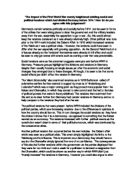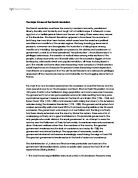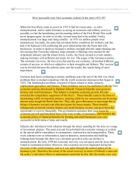The Weakness of the Directory was the main reasons for Napoleons rise to Power. How far do you agree?
The Weakness of the Directory was the main reasons for Napoleon's rise to Power. How far do you agree? On 10th November 1799 the Coup of Brumaire brought about a leader who would bring France's power to the forefront of Europe, a nation feared by all others. The coup was the final of a series of coups between 1797 and 1799. This shows that the Directory was extremely weak which caused Napoleon to rise to power, however there were other reasons as well, such as Napoleon's political connections, his success in wars and his own personal strengths, and the opportunities he creates for himself. The revolution in France was by no means a quick process, taking over ten years before stability was finally regained and Napoleon came to power. During the ten years there were many different types of government all with different ideas, however not one of the governments really affected the peasants, thus the people of France became fed up. Fed up of paying taxes to sort out the massive financial chaos, fed up of paying for pointless wars and so people just didn't care enough to stop Napoleon rising to power, despite warnings about him from Benjamin Constant, who believed he was to self-centred, which through policies in the Napoleonic Code actually turn out to be true. The revolution also created a whole in the army due to many of the military generals who were loyal to the king,
Using these four passages and your own knowledge, assess the view that Napoleons Empire in Europe after 1804 offered little benefit to its subjects.
Adam Appleby Centre No. 39339 Candidate No. 7004 Using these four passages and your own knowledge, assess the view that Napoleon’s Empire in Europe after 1804 offered little benefit to its subjects. Views regarding if Napoleon offered virtuous benefits to the subjects of his Empire are fraught with different view points. Interpretations B and C both agree with the viewpoint that Napoleon offered very little benefit to his subjects, “The ideals of legal equality… social designs”, interpretation. Conversely, interpretations A and D support the opposite idea that being part of the Napoleonic Empire was actually very beneficial to the subjects, “liberated from seigniorial rights”; “Even the downsides such as… for a centralized state”. Taking all interpretations into consideration and actual knowledge of the Napoleonic Empire, it is easy to see that while Napoleon ruled with an iron fist, he did indeed offer several benefits to subjects of his Empire directly or indirectly which both can be seen in Poland by the use of Napoleon in their national hymn of living up to ‘us and Napoleon’ interpretation D. Both interpretations, A and D, show clear disagreement with the view that Napoleon was of little benefit to European subjects after 1804. Firstly interpretation A shows this with “Napoleon saw the Civil Code… the Civil Code everywhere.” This contradicts
Assess the successes and failures of Mussolini's domestic policy.
Assess the successes and failures of Mussolini's domestic policy. Mussolini's primary aim in 1919 when he came into power was to fascitise the Italian nation as a whole, young and old; he wanted his nation to be utterly committed and disciplined towards the new fascist state rather than being passive and going along with everyone else. To achieve this goal, Mussolini set about trying to influence and ultimately change make domestic establishments more 'fascist', that is, to follow the principles of a very right-wing, nationalist totalitarian state in which the 'Duce is always right' and in which the principles of 'Believe, Obey, Fight' are considered paramount. Mussolini attempted to alter Church-state relations, to create the perfect fascist woman, to fascitise the educational system and the youths of Italy, to change Italy's economic and political structure, and to create a nation that would be respected by other nations, by using his strategies of the 'battle for land, grain and births' and by proving the strength of the nation through sporting achievements. However, Mussolini's policies failed to unite the country and fascitise the nation as a whole; his economic polices were disastrous, Italy was fairly weak politically, and women and teenagers failed to be heavily affected by a fascist state; Mussolini did handle the Church-State relations well however but in the
To what extent does Stalin deserve the title of Red Tsar when assessing his rule in the context of Russian government from 1855- 1964?
To what extent does Stalin deserve the title of 'Red Tsar' when assessing his rule in the context of Russian government from 1855- 1964? When Stalin rose to power in 1929 he claimed to the Russian public that he was a devote follower of Leninism; his slogan 'Lenin is always with us'1 meant that Stalin wanted to show how similar he was to Lenin. However Stalin asserted his power at the head of government much like the Tsars by employing tactics of fear and propaganda. Stalin's personal dictatorship meant he had strong elements of being 'Red Tsar' as he established unquestionable rule, this idea of being a 'Red Tsar' came from the belief that Stalin wasn't committed to communism, as his traditional ideas were reminiscent of Tsarist autocratic rule, so effectively he was a fusion between the two ruling styles. As Stalin wished to portray himself as a 'God-like' figure; this made him an isolated leader who tolerated no criticism, similar to the style of ruling under the Tsars, as both leaders dismissed ministers at their own will and chose to act on their own personal feelings, for example like the Russification policy of employed by all the Tsars, but in particular Alexander II and the nationalistic policies of Stalin. Stalin's government was 'top-down'2, and unlike Lenin and Khrushchev, Stalin was very wary of how much his fellow party members knew. Therefore he employed a
Why did the League of Nations fail?
Why did the League of Nations fail? By Richard Ward [email protected] The objectives of the League of Nations were to 'promote international co-operation and to achieve peace and security'. The League failed these ideals as early as 1921, when Poland occupied Vilna. It failed these objectives once more in 1923 when Mussolini held Greece ransom by occupying and bombing the island of Corfu. Yet the League was not dissolved until 1946. It continued to meet and its agencies continued their work. It was only after 1936 and the collapse of Abyssinian resistance that public opinion swung against the League on a great scale. Until the early 1930s, the League of Nations had been displayed in a favourable light as a success. The failures at Corfu and Vilna had been overshadowed by successes at the Åland Islands and in the Greek-Bulgarian war and the booming world economy. Added to that, improvements in international relations had cast a general aura of wellbeing over the world. In hindsight, it is arguable that the League had failed shortly after it had started, but at that time everyone was shocked at the realisation that the League was not everything it said it was. On October 24th 1929, the US stock market in Wall Street crashed. The value of shares plummeted as the stock market was ordered to 'sell at any price'. Herbert Hoover, US President, had advocated the
Assess the view that the lives of the peasants in Russia did not improve in the period from 1855 to 1964.
Assess the view that the lives of the peasants in Russia did not improve in the period from 1855 to 1964. When assessing the view that the lives of the peasants did not improve throughout the 1855-1964 period, several key factors must be taken into consideration. These include their living and working conditions, policy towards them, the educational opportunities available to them and the political representation they had under Tsarist and Communist Governments. Once all of these factors have been taken into consideration, it becomes clear that the peasantry did not enjoy a prominent time under Tsarist or Communist Governments, and their lives did not improve in the period. For the majority of the period, living conditions for the average peasant remained uniformly bleak. Prior to 1917, accommodation was often of a low standard as demand outstripped supply following an influx to the cities, such poor living conditions had a detrimental effect on their quality of life which was also evident under the communists, where living conditions remained in an equally bad, if not worse state compared to the Tsars. Despite Khrushchev continuing Stalin's efforts to build more social housing and improve the situation, these were often of poor quality and hastily built. This meant that the peasantry did not see any real increase in living conditions between 1855-1964. In contrast to the
The impact of the First World War merely heightened existing social and political tensions which had divided Germany before 1914. How far do you agree with this judgement?
'The impact of the First World War merely heightened existing social and political tensions which had divided Germany before 1914.' How far do you agree with this judgement? Germany's certain tensions politically and socially before 1914 can be seen in forms of the strikes that were taking place to deter the government and the military leaders away from the war, essentially the opposition to go to war. So, this would almost keep the tensions consistent as it was already relatively high. Other political tensions prior to the 1914 mark included the Zabern Affair in 1913 which increased tensions of the Reich as it was a political crisis. However, the tensions could have seen to differ after the war especially with growing opposition. As the Second Reich had a lot of issues already so the 'tensions' themselves were already in full effect and could be seen to only get worse with events such as starting a war that was preventable. Social tensions were as the statement suggests were present before WW1 in Germany. Pressure groups highlighted the divisions and tensions in Germany despite them usually focusing on single issues yet after the economic and social changes they emerged due to these changes. Although, it is seen to be that some social effects just didn't affect the tension in Germany. The 'silent dictatorship' also stemmed tensions as in 1916 Bethmann called off
How successful were the Five- Year Plans in transforming Russian industry in the years to 1941?
How successful were the Five- Year Plans in transforming Russian industry in the years to 1941? By Gabriella Pink Stalin made three five-year plans spanning from 1928 to 1941. He had very different aims for each of the plans and had some very optimistic targets for the achievements of these plans. An over riding theme of each of the plans was industry. Stalin wanted to restore Russia’s hold on industry and make it a great trading power once again. The five year plans were very successful in helping building up the Russian industry. They did this through many ways, each contributing in a different manner. The production of raw materials increased dramatically thought eh five-year plans and industry on a whole became a lot more efficient. This can be seen through statistics that show the production in tonnes. Such materials as; coal, iron and steel, all rose in production quite dramatically. Iron rose from 4.2 million tonnes to 6.2 million tonnes, coal from 29.1 million tonnes to 64.3 million tonnes and steel from 4.0 million tonnes to 5.9 million tonnes. These were huge increases at that time. For an country that was struggling as much as Russia was at that time, it was an achievement. Stalin had many initiatives to achieve a better industry. He put in place a reward scheme for workers if they helped reach the targets that were set. Workers were encouraged to work for
Explain how the effects of the First World War caused the collapse of the Tsarist regime
) Explain how the effects of the First World War caused the collapse of the Tsarist regime (8 marks) There were many causes of the collapse of the Tsarist regime. One of the biggest causes, however, was the First World War, as it had many effects on everyone in Russia, who all blamed the Tsar. The Tsar abdicated in 1917 because he had no control over anyone in Russia. He had no support. This was because everyone in Russia blamed the Tsar for something. They layed all the blame at his feet because he was in charge and was the only person who could change things. One of the main reasons why the 1905 revolution failed was because the Tsar had the support and control of the military. By the time the 1917 revolution had started, the Tsar had lost this support and control. He had no protection. This happened because of the war. Firstly, the army was very poorly equipped, as some men didn't have any boots and only a third of men had rifles. The army also had very incompetent leaders. There is evidence of this in the battles at Tannenberg and the Masurian Lakes. In both of these, the 'huge Russian armies' (Brooman 1994) were wiped out when they should have easily beaten a single German army. The poor leadership combined with the poorly equipped army made Russia suffer many defeats in the war. By 1917, 0.8 million Russian troops had been killed, 4.6 million wounded and 3.3 million
To What Extent was fear of the Gestapo and the SS the main reason why Hitler was able to stay in power after 1933?
To What Extent was fear of the Gestapo and the SS the main reason why Hitler was able to stay in power after 1933? After Hitler was made chancellor in 1933 and Fuhrer after Hindenburg's death, there were a number of factors that secured his status as Fuhrer with many legal and violent methods. His use of the Gestapo and the SS was certainly important to his ability to stay in power after 1933. This was not the only reason why he stayed in power, propaganda, his use of the state and party and social benefits all contributed to him staying as Fuhrer. Of course being leader, Hitler himself was a reason with his personal skills as the leader. Fear of the Gestapo and the SS was a important factor of this but their were certainly other reasons for Hitler's status to be secured. Fear of the Gestapo and the SS was a reason why Hitler stayed in power after 1933 as both organisations' techniques of spreading terror over Germany. This fear would have significantly reduced the number of people and groups standing against the Nazis as everyone knew the consequences for their actions could be severe. There is no doubt that the two organisations had a bad reputation for being very violent towards opposition and people that upset Hitler but it is debatable whether they actually had a huge impact on Hitler's ability to stay in power. The traditional view was that terror was a part of

















